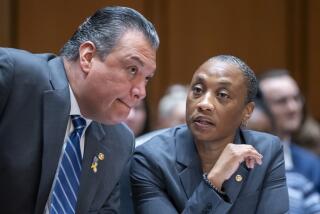More Senate Democrats, including Boxer, line up behind Iran nuclear deal

Democratic Sen. Tim Kaine of Virginia said the Iran nuclear deal is “far preferable to any other alternative, including war.”
- Share via
Reporting from Washington — The proposed Iran nuclear deal earned the support of three more Senate Democrats on Tuesday, locking in key support for President Obama’s top foreign policy priority.
California Sen. Barbara Boxer joined Sens. Tim Kaine of Virginia and Bill Nelson of Florida in expressing support Tuesday while on the other side of the Capitol, a resolution aimed at blocking the multinational agreement was formally introduced in the House. The moves come as Obama prepares to deliver a major address Wednesday to build support for the agreement, which was finalized last month in Vienna between Iran and a group of world powers led by the United States.
Boxer announced her position after a meeting between Democrats and ambassadors representing the countries that signed the agreement. Under it, Iran agreed to new restrictions on its nuclear program in return for easing crippling economic sanctions.
“It was very important to hear from them that they believed if we walked away, it would play right into the hands of the hard-liners in Iran, Iran would build a nuclear weapon, they’d have lots of money from everybody else but America, and it’d be a very dangerous situation,” she said.
Nelson echoed Boxer’s comments in a speech on the Senate floor, warning that if Congress were to reject the agreement, “there’s no question in this senator’s mind that the sanctions will start to erode, and they may collapse altogether.”
Kaine, an emerging foreign policy voice for Democrats in the Senate, said in a separate floor speech that the deal was “far preferable to any other alternative, including war.”
“In this deal, America has honored its best traditions and shown that patient diplomacy can achieve what isolation and hostility cannot,” he said.
But another key voice, Sen. Charles E. Schumer of New York, said he still was studying the deal and signaled that his decision was still weeks off. Schumer, the presumptive leader of Senate Democrats in the next Congress, said he would not let “personal, political or party” influence his decision.
House Foreign Affairs Committee Chairman Ed Royce (R-Fullerton) introduced a joint resolution Tuesday expressing that Congress “does not favor the agreement.” It would also prevent the U.S. from easing sanctions, which was crucial to Iran agreeing to the deal. Republicans already say they have enough votes to pass it in the House. In the Senate, it remains unclear whether there are the 60 votes needed to bring the resolution to a final vote.
Senate Majority Leader Mitch McConnell (R-Ky.) said Tuesday that when the Senate returns to consider the measure in September, it should “actually have a debate that rises to the occasion that this seems to require.” He said he would seek agreement for enough time for all 100 senators to attend and speak during a formal debate in September, something the chamber rarely does.
Other undecided lawmakers like Sen. Richard Blumenthal (D-Conn.) said they will continue to study the agreement during the congressional recess, and solicit the input of their constituents.
Groups on both sides of the issue will continue to make their case on the airwaves and at town-hall meetings hoping to sway key votes. But Sen. Richard J. Durbin (D-Ill.), the Democratic whip and a supporter of the deal, said his undecided colleagues were unlikely to be swayed by public pressure.
“When I voted against the Iraq war, the public opinion polls were in favor of it. And what happened afterwards?” he said. “So I think people understand that the public by and large is picking up little pieces of information here and there. It’s our job to look at the whole picture and look at the agreement in its entirety.”
More to Read
Sign up for Essential California
The most important California stories and recommendations in your inbox every morning.
You may occasionally receive promotional content from the Los Angeles Times.











